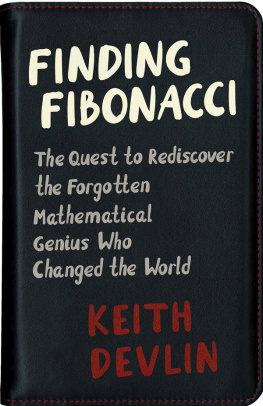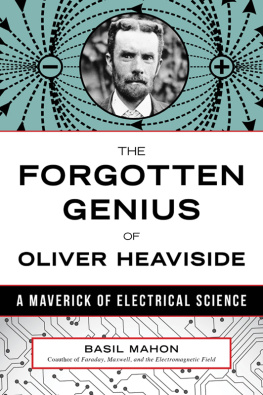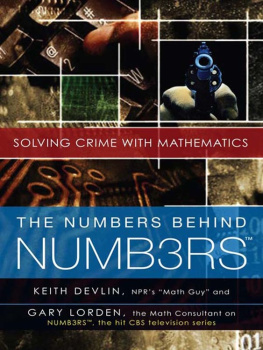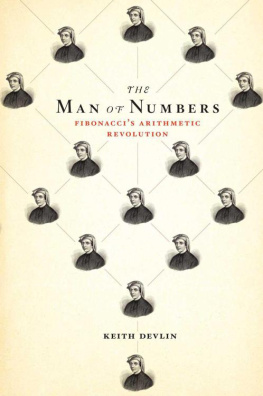


Copyright 2017 Keith Devlin
Requests for permission to reproduce material from this work should be sent to Permissions, Princeton University Press
Published by Princeton University Press, 41 William Street, Princeton, New Jersey 08540
In the United Kingdom: Princeton University Press, 6 Oxford Street, Woodstock, Oxfordshire OX20 1TR
press.princeton.edu
Jacket art courtesy of Shutterstock
All Rights Reserved
ISBN: 978-0-691-17486-0
L ibrary of C ongress C ontrol N umber 2016962928
British Library Cataloging-in-Publication Data is available
This book has been composed in Gentium Plus
Printed on acid-free paper
Printed in the United States of America
1 3 5 7 9 10 8 6 4 2
Contents
PRELUDE
Sputnik and Calculus
CHAPTER 8
Publishing Fibonacci: From the Cloister to Amazon.com
APPENDIX
Guide to the Chapters of Liber abbaci

Sputnik and Calculus
If my name is familiar to you, chances are its because you have read one of my mathematics books (Ive written around 35, many of them for the general reader), or perhaps youve read an article I have published in a magazine or newspaper, read one of my blogposts (I maintain four blogs), taken part in one of the sessions of my massively open online course (MOOC) on mathematics, or heard me on National Public Radio, where I am known as the Math Guy. Yes, I am that Keith Devlin. And yes, I love math.
By most peoples standards, Im also pretty good at math. But it wasnt always so. In the first few years of elementary school, I was one of the poorest performing children in mathematics. In fact, I was the last kid in the class to memorize my multiplication tables, a rite of passage that loomed large in the mathematics education mandated in 1950s England. Mastering the multiplication tables (todays math educators call them multiplicative number bonds, presumably to give them a more modern ring) caused me so much anxiety that my parents had to go to the teacher to explain that my abysmal performance was not due to lack of effort on my part. Rather, I simply did not get it. I was not, they said, a math type.
Things improved by the time I was aged 9, and as a result of precocious classroom performances in all disciplines, including math, I skipped year 10 and went straight into year 11, the final year of elementary school, taking the national 11 Plus selection exam for secondary school placement at age 10. I was the only kid at that school to pass that exam, meaning I was allocated a place in an academically focused secondary school (a Grammar School), rather than the more common Secondary Modern School, designed to prepare the next generation of British factory workers, the kind of school to which all (and I mean all) of my classmates went on to attend.
Looking back, my early difficulty with math was likely because I got stuck trying to understand multiplication, whereas everyone else simply memorized the tables like a meaningless passage from Jabberwocky. But back then, no one else in my world thought of mathematics as something you understand; rather, it was a meaningless memorization hurdle you had to master to progress through the system, justified with the mantra You will need it in later life. (In my case, it turned out I actually did make use of all that school math, including the multiplication tables, but that was because I became a mathematician. By the time I was at university, electronic calculators had arrived on the scene, rendering obsolete the one demonstrably practical advantage of mastery of the multiplication tables.)
I entered grammar school in 1958 (by then having reached the official age of 11), the year Russia launched the first satellite (Sputnik) into space. For this science-fiction-mad young male, that event was dramatic. Humankind was about to enter the Space Age, and I wanted to be part of it, the more so when the TV news showed US president John F. Kennedy announce that they (the Americans, still riding high after saving Europe from the Nazis in the Second World War and giving everyone seductive cinema entertainment) were going to put a man on the moon.
So I began my high school career with the goal of becoming a space scientist. I wasnt entirely sure what that meant, but physics was clearly a part of it. And since you needed math to do physics, I realized that math was also something in which I had to excel. But whereas physics made sense to me, mathematics did not. I did not particularly like it, viewing it mostly as a disjointed collection of recipes and tricks for solving numerical problems. I put effort into it mainly because it was part of my path to becoming a space scientist.
Sure, I liked that feeling of satisfaction you get when you solve a math problem, but I did not view mathematics as a single discipline the way I saw physics. Math was, to me, just a useful toolbox for doing physics. But then everything changed when, at age 16, I started to learn calculus.
Calculus is unbelievably powerful. It is the mathematical tool that allows you to formulate and solve the equations required to put a man on the moon. Yet at the same time it is deeply mysterious.
As I learned much later in life, the mystery came from the way it was taught. The math teacher provided us with a list of symbolic rules for calculating derivatives and integrals. Master those rules, and you can solve all the equations of space flight. But those symbolic rules were just, well, weird. Why should the slope of the curve x n be nx n-1 ? And it was just too simplistic to believe that the slope of sin( x ) was cos( x ). Not even Hollywood movies would be so crass. Yet, according to my calculus textbook, that was the rule.
Still, being older and wiser than the five-year-old me, the sixteen-year-old me did not let my lack of understanding hold me back, the way it had with multiplication. I just practiced applying all of the rules until I could solve all the problems in the calculus textbook. (In the process, I actually did solve them all .)
But I was not content to simply use those rules. I really did want to understand them. In the course of striving for that understanding, I came to see mathematics not as a collection of disjointed techniques, procedures, and tricks, but as a single, coherent whole, a vast, cognitive landscape, built up over three millennia by some of the smartest people the world has ever seen. It was a landscape that was both powerful and rich in beauty.
By the time I graduated from high school at age 18, I no longer wanted to be a space scientist. I had become a mathematician, in spirit if not yet expertise. Compared to the mathematical universe I had glimpsed a few parts ofmostly by devouring the few popular mathematics books then available, a genre I would spend a large part of my adult life writingOuter Space seemed boring.
Which is why I entered university to study not physics, but mathematics. Six years later, I had earned both a bachelors and doctoral degree in mathematics (along the way finally gaining an understanding of calculus, the goal that had first led me to take that path), and I began my career as a professional mathematician. The year was 1971. I was 24 years of age.
Next page








